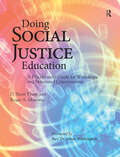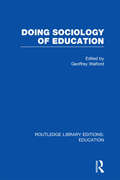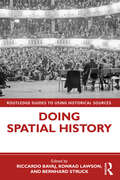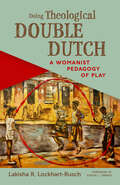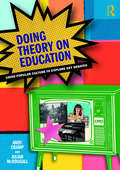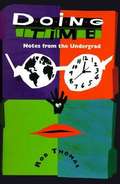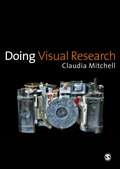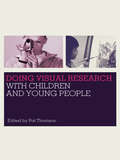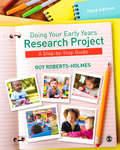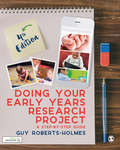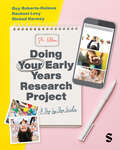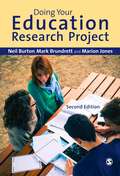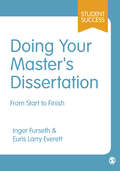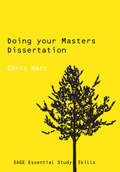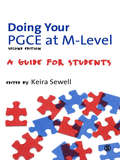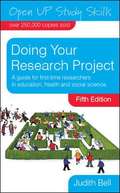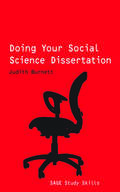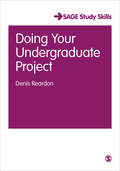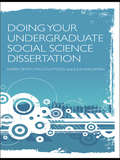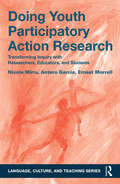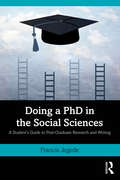- Table View
- List View
Doing Social Justice Education: A Practitioner's Guide for Workshops and Structured Conversations
by D. Scott TharpThis book is principally written for entry-level student affairs and non-profit staff who develop and facilitate social justice education workshops and structured conversations, as well as for student peer educators who are often employed to assist in the facilitation of such workshops for their peers. It is suitable for anyone starting out to do such work.It provides readers with a practical framework and hands-on tools to craft effective and positive interventions and workshops that are relevant to context and are true to the facilitator’s own circumstances.It offers a succinct but comprehensive introduction to the planning, design, and facilitation of social justice experiences, grounding readers in relevant theory, taking into account participants’ prior understandings of issues of race and privilege, institutional environment and campus climate, and the facilitator’s positionality. It provides guidance on defining outcomes and developing content and exercises to achieve workshop goals.Starting from the premise that the facilitation and delivery of social justice education experiences should be grounded in scholarship and that such experiences can only achieve their ends if crafted to meet the unique characteristics and circumstances of the institution and workshop participants, the authors begin by synthesizing current theory on social justice education and cultural competence, and then guiding readers on analyzing the context and purpose of their workshop. They provide readers with an easy to follow five-part framework to systematically design social justice education workshops and structured conversations and to assess the resulting learning. Particularly valuable for those starting out in this work is guidance on facilitation and on the use and selection of exercises to align with goals and participants' characteristics and social identities.
Doing Sociology of Education (Routledge Library Editions: Education)
by Geoffrey WalfordThis collection of specially commissioned articles exposes the practical and personal influences on the process of doing sociology of education. All of the authors have been involved in conducting well know major research projects, and discuss here the pitfalls and problems, conflicts and compromises that went into doing their particular research. A particular feature of the book is that a wide variety of types of research in the sociology of education is covered. The range is from small-scale ethnographic case studies to large-scale postal questionnaire sample surveys and includes studies based on interviews, observation and questionnaires. There are examples of longitudinal work in case studies and in surveys. The collection also includes discussions of action research, the development and influence of theory, and the relationship between research and policy.
Doing Spatial History (Routledge Guides to Using Historical Sources)
by Bernhard Struck Riccardo Bavaj Konrad LawsonThis volume provides a practical introduction to spatial history through the lens of the different primary sources that historians use. It is informed by a range of analytical perspectives and conveys a sense of the various facets of spatial history in a tangible, case-study based manner. The chapter authors hail from a variety of fields, including early modern and modern history, architectural history, historical anthropology, economic and social history, as well as historical and human geography, highlighting the way in which spatial history provides a common forum that facilitates discussion across disciplines. The geographical scope of the volume takes readers on a journey through central, western, and east central Europe, to Russia, the Mediterranean, the Ottoman Empire, and East Asia, as well as North and South America, and New Zealand. Divided into three parts, the book covers particular types of sources, different kinds of space, and specific concepts, tools and approaches, offering the reader a thorough understanding of how sources can be used within spatial history specifically but also the different ways of looking at history more broadly. Very much focusing on doing spatial history, this is an accessible guide for both undergraduate and postgraduate students within modern history and its related fields.
Doing Theological Double Dutch: A Womanist Pedagogy of Play
by Lakisha R. Lockhart-RuschEmbodied womanist play brings us closer to ourselves, to others, and to the divine. In this remarkably innovative book, Lakisha R. Lockhart-Rusch offers a fresh vision for theological education rooted in the embodied insights of Black women. Acknowledging the historical reality that play has often been a privilege reserved for those in power, Lockhart-Rusch shows how play has nonetheless functioned as a hidden space of agency, healing, and resistance for Black women. Using the game of Double Dutch as an extended metaphor, she demonstrates how a womanist pedagogy of play offers a transformative encounter with the love of self and of God for students from all backgrounds. Coupling theory with practical tools, this book equips theological educators to teach across difference for the liberation of all.
Doing Theory on Education: Using Popular Culture to Explore Key Debates
by Julian McDougall Andy CrampDoing Theory on Education explores key debates using examples from contemporary media and popular culture to guide Education Studies students through the perennial debates that surround teaching and learning. Aimed at undergraduates, postgraduates and teachers in education settings, it uses over seventy popular culture texts from television, music, videogames, fiction, film, architecture, social media, the press and art to illuminate important issues and make the critical theory that underpins educational debates more accessible and engaging. Each chapter also offers essential background knowledge and historical perspective and includes reflective activities to help you develop a critical approach, enabling you to argue your own point of view with confidence and consider where issues may progress to in the future. It examines core issues such as: Class and educational choice Learning styles Testing and assessment What counts as knowledge Leadership and professionalism Education students and those in education settings often struggle to see the value of theory. Doing Theory on Education: Using Popular Culture to Explore Key Debates is an accessible text designed for educationalists who want to put theory to work as an active strategy for influencing thinking and practice.
Doing Time
by Rob ThomasEach of these ten short stories focuses on a high school student's mandatory 200 hours of community service and the student's response to the required project.
Doing Visual Research
by Claudia MitchellDoing Visual Research offers an innovative introduction to the use of photography, collaborative video, drawing, objects, multi-media production and installation in research. Claudia Mitchell explains how visual methods can be used as modes of inquiry as well as modes of representation for social research. The book looks at a range of conceptual and practical approaches to a range of tools and methods, whilst also highlighting the interpretive and ethical issues that arise when engaging in visual research. Claudia Mitchell draws on her own work in the field of visual research throughout to offer extensive examples from a variety of settings and with a variety of populations. Topics covered include: • Photographs and memory work studies • Video and social change • Participatory archiving with drawings and photos • Working with images/Writing about images • Can visual methods make a difference? From practice to policy Doing Visual Research takes an interdisciplinary approach to the subject of visual research, producing a practical introduction to the subject that will be of great use to students and researchers across the social sciences, and in particular in education, communication, sociology, gender, development, social work and public health.
Doing Visual Research with Children and Young People
by Pat ThomsonVisual media offer powerful communication opportunities. Doing Visual Research with Children and Young People explores the methodological, ethical, representational and theoretical issues surrounding image-based research with children and young people. It provides well-argued and illustrated resources to guide novice and experienced researchers through the challenges and benefits of visual research. Because new digital technologies have made it easier and cheaper to work with visual media, Pat Thomson brings together an international body of leading researchers who use a range of media to produce research data and communicate findings. Situating their discussions of visual research approaches within the context of actual research projects in communities and schools, and discussing a range of media from drawings, painting, collage and montages to film, video, photographs and new media, the book offers practical pointers for conducting research. These include why visual research is used how to involve children and young people as co–researchers complexities in analysis of images and the ethics of working visually institutional difficulties that can arise when working with a ‘visual voice’ how to manage resources in research projects Doing Visual Research with Children and Young People will be an ideal guide for researchers both at undergraduate and postgraduate level across disciplines, including education, youth and social work, health and nursing, criminology and community studies. It will also act as an up-to-date resource on this rapidly changing approach for practitioners working in the field. Pat Thomson is Professor of Education and Director of Research in the School of Education, University of Nottingham, UK. She is a former school principal of disadvantaged schools in Australia.
Doing What Scientists Do: Children Learn To Investigate Their World
by Ellen Doris"This is a splendid, down-to-earth book-especially for elementary teachers who want to do science but are unsure how to go about it. The intensity of children's interest is unmistakable. And Ellen's low-key style reassures the reader that children in any classroom can do work that is just as fine." Eleanor Duckworth, Harvard University "I want to embolden teachers who are uncertain about teaching science, and encourage others to give children's observations a central place in the curriculum." Ellen Doris When it first published, Ellen Doris' now-classic text rapidly became an indispensable resource for teachers who were searching for new ways to introduce students to science. This second edition will be every bit as essential for teachers and science leaders. Novice teachers and those looking to refresh their practice will find support to help children explore, experiment, and figure things out. Ellen deftly translates the theory of inquiry-based science instruction into methods teachers can use. She answers questions and offers advice on these central elements: how to begin how to inspire children's curiosity and facilitate their investigations how to assess children's understanding through their drawing, discussion, and writing how to structure classroom spaces, supervise fieldwork, and help children learn from one another how to keep children's priorities as well as science standards in mind. Lively classroom examples enrich Ellen's discussion. Her latest thinking will guide teachers and science leaders as they create contexts in which children can inquire, investigate, and collaborate.
Doing Your Early Years Research Project: A Step by Step Guide
by Guy Roberts-HolmesUndertaking a research project can be a daunting task for early years students. This step-by-step guide clearly shows you how to organize and structure your project, write a literature review, interpret findings, and successfully present your research. Bringing the whole process to life through practical examples and real case studies, the book is packed with summaries, key points, checklists, and discussion topics, encouraging you to engage with and reflect on your own work. The Third Edition is fully updated to include: New chapters on writing your literature review and structuring your final project Increased coverage of e-research data collection methods New real-life student examples and case studies from the UK and internationally Additional online 'top tips' videos from the author. This is an essential companion for students on undergraduate and postgraduate early childhood courses, teacher education, nursing, and social sciences. It is also useful for early years practitioners required to carry out small-scale research. Dr. Guy Roberts-Holmes is Senior Lecturer in Early Childhood Education at the Institute of Education, University of London. ? Guy Roberts-Holmes will be discussing key ideas from Doing Your Early Years Research Project: A Step by Step Guide in the SAGE Early Years Masterclass, a free professional development experience hosted by Kathy Brodie. To sign up, or for more information, click here.
Doing Your Early Years Research Project: A Step by Step Guide
by Guy Roberts-HolmesThis new edition of a much-loved book guides you through your Early Years research project from start to finish and draws on the work of Early Years practitioners to illustrate concepts and methods, bringing the entire process to life. Packed with research summaries, key points, checklists and discussion topics, the author shows you how to organise and structure your project, write a literature review, interpret findings and present/write up your project. This edition has been fully updated and revised to include up-to-date references, a focus on 'Reflective Practice', and coverage of Early Years Foundation Stage, as well as: - Coverage of Action Research, including examples - Increased material on using, presenting and analysing data, including using software - More reflective and detailed study aid including case studies, surveys, questions and activities This book is essential reading for students on early childhood studies courses, those working towards Early Years Professional Status (EYPS), teacher education, nursing, and social sciences. It is also useful for early years practitioners required to carry out small-scale research.
Doing Your Early Years Research Project: A Step by Step Guide
by Guy Roberts-HolmesThis bestselling guide to undertaking your Early Years research project takes the reader on a practical step-by-step journey. Breaking down each section into accessible and digestible topics, and accompanied by a multitude of practical examples, case studies, research summaries and key points, the author brings this process to life. The updated and revised fourth edition includes: Useful additional resources at the end of each chapter Extended material on the child’s voice within research Signposted glossary terms throughout the text Updated website materials for further study From learning how to structure and organise your project, through to the final presentation and written report of your findings, this is the essential guide and companion for undergraduate and postgraduate students throughout their early childhood and social science courses. Guy Roberts-Holmes will be discussing key ideas from Doing Your Early Years Research Project: A Step-by-Step Guide in the SAGE Early Years Masterclass, a free professional development experience hosted by Kathy Brodie. To sign up, or for more information, click here.
Doing Your Early Years Research Project: A Step by Step Guide
by Guy Roberts-HolmesThis bestselling guide to undertaking your Early Years research project takes the reader on a practical step-by-step journey. Breaking down each section into accessible and digestible topics, and accompanied by a multitude of practical examples, case studies, research summaries and key points, the author brings this process to life. The updated and revised fourth edition includes: Useful additional resources at the end of each chapter Extended material on the child’s voice within research Signposted glossary terms throughout the text Updated website materials for further study From learning how to structure and organise your project, through to the final presentation and written report of your findings, this is the essential guide and companion for undergraduate and postgraduate students throughout their early childhood and social science courses. Guy Roberts-Holmes will be discussing key ideas from Doing Your Early Years Research Project: A Step-by-Step Guide in the SAGE Early Years Masterclass, a free professional development experience hosted by Kathy Brodie. To sign up, or for more information, click here.
Doing Your Early Years Research Project: A Step by Step Guide
by Guy Roberts-Holmes Rachael Levy Sinead HarmeyThis best-selling guide to undertaking your Early Years research project takes you on a practical step-by-step journey. Breaking down each section into accessible and digestible topics, and accompanied by a multitude of practical examples, case studies, research summaries and key points, the author brings this process to life. The updated and revised edition includes: All chapters have been updated with new content on working in an online environment Completely revised Chapter 10, packed with new content New activities and case studies throughout From learning how to structure and organise your project, through to the final presentation and written report of your findings, this is the essential guide for undergraduate and postgraduate students throughout their early childhood or early years courses.
Doing Your Early Years Research Project: A Step by Step Guide
by Guy Roberts-Holmes Rachael Levy Sinead HarmeyThis best-selling guide to undertaking your Early Years research project takes you on a practical step-by-step journey. Breaking down each section into accessible and digestible topics, and accompanied by a multitude of practical examples, case studies, research summaries and key points, the author brings this process to life. The updated and revised edition includes: All chapters have been updated with new content on working in an online environment Completely revised Chapter 10, packed with new content New activities and case studies throughout From learning how to structure and organise your project, through to the final presentation and written report of your findings, this is the essential guide for undergraduate and postgraduate students throughout their early childhood or early years courses.
Doing Your Education Research Project
by Marion Jones Neil Burton Mark BrundrettIf you are a trainee teacher or experienced practitioner new to research, or are simply wondering how to get started on your education research project, this practical book will be your guide. The authors offer simple steps to ensure that you ask the key questions in the most effective way possible. The book guides you through the entire research process: from clarifying the context and conceptual background, to presenting and analysing the evidence gathered. Supported by examples, checklists and diagrams, this fully revised and updated edition includes a wealth of information on: Research design Evidence gathering techniques Practitioner research Ethics Data analysis techniques. This book will be valuable to anyone begining a research or a professional or a professional or school development project, whatever stage they are at within the teaching community, from training for QTS, higher degree, or in need of evidence-backed decisions for the strategic development of their school.
Doing Your Master's Dissertation: From Start to Finish (SAGE Study Skills Series)
by Inger Furseth Euris Larry Everett'From finding a research topic through to the final write up, this clear guide takes the mystery out of graduate-level research. This book will help your project succeed' -James V. Spickard, Professor of Sociology, University of Redlands, US Just starting your Master's? Worried about your dissertation? This book is an indispensible guide to writing a successful Master's dissertation. The book begins by addressing issues you'll face in the early stages of writing a dissertation, such as deciding on what to research, planning your project and searching for literature online. It then guides you through different aspects of carrying out your research and writing up, helping you to: -write a research proposal - choose one or more methods - write the introduction and conclusion - discuss the literature - analyse your findings - edit and reference - formulate research questions - build your argument The book offers guidance that other books often miss, from dealing with emotional blocks, to ways of identifying your strengths and weaknesses, and improving your writing. It addresses the social aspects of the writing process, such as choosing and working with an advisor, using social media and forming student work groups for added help and inspiration. Each chapter ends with an action plan, which is a resource section that features exercises and reflection questions designed to help you apply what you've read to your own work. SAGE Study Skills are essential study guides for students of all levels. From how to write great essays and succeeding at university, to writing your undergraduate dissertation and doing postgraduate research, SAGE Study Skills help you get the best from your time at university.
Doing Your Masters Dissertation (SAGE Study Skills Series)
by Chris HartDoing Your Masters Dissertation is a practical and comprehensive guide to researching, preparing and writing a dissertation at Masters level. It adopts a well-structured and logical approach, and takes the student through all the stages necessary to complete their research and write a successful dissertation. Key features of the book include: Step-by-step coverage - sections on choosing a topic, research design, methodology and presenting data and writing up An up-to-date list of key reference materials, both printed and electronic Advice on ethical guidelines Information on assessment criteria Student-focused throughout with a broad range of worked examples and guidelines for further reading. Written in an engaging and accessible manner, this textbook is an essential resource for postgraduate students across the social sciences required to complete a Masters dissertation. SAGE Study Skills are essential study guides for students of all levels. From how to write great essays and succeeding at university, to writing your undergraduate dissertation and doing postgraduate research, SAGE Study Skills help you get the best from your time at university. Visit the SAGE Study Skills website for tips, quizzes and videos on study success!
Doing Your PGCE at M-level: A Guide for Students
by Keira SewellWhat is PGCE at M-Level and what can you expect from the course? How can it help you to develop as a professional? Masters-level study is now a well established component of PGCE courses and this new edition of the best-selling student guide offers a clear and concise overview of M-level aspects in teacher education. This second edition includes discussion of recent developments in education policy, greater coverage of reflective practice in school-based training and up-to-date advice on how to get a teaching job at the end of your course. With new reflective activities designed to help students develop critical skills, and improved references to additional material, this book is essential reading for students on PGCE courses in primary and secondary education. Keira Sewell leads Visionary Education (www. visionary-education. co. uk), an education consultancy covering teacher training, science education, strategic development and business and industry partnerships. Contrbutors to the book are members of the primary and secondary PGCE teams at the University of Southampton, Edge Hill University, the University of Dundee and an independent consultant supporting Higher Education Institutions. Praise for the book: "Doing your PGCE at M level is a valuable guide designed to enable students to achieve success. Its approach, using clear explanations and case studies enable trainees to engage at a critical level and understand the potential benefits this can bring to them personally and professionally. Moving forward from the first edition in a way that incorporates education policy from recent fast moving times this enables trainees to critique and identify how the education arena is shaped. This new edition also enables trainees to develop many of the key skills of M-Level work; the development of reflective activities to enable deep reflection and critical analysis is a welcome development. This comprehensive text will be a valuable resource for anyone training to be a PGCE teacher. " - Tim Roberts, PGCE Programme Director, University of Hertfordshire
Doing Your Research Project: A guide for first-time researchers in education, health and social science
by Judith BellStep-by-step advice on completing an outstanding research project. Research can be daunting, particularly for first-timers, but this indispensable book provides everything you need to know to prepare for research, draft and finalise a methodologically sound and well-written report or thesis, plus it warns you of potential pitfalls to prevent you wasting time on false trails. This new edition of Doing Your Research Project has been thoroughly updated and includes: Wider coverage of research ethics Clear guidelines on the differences between different types of research project New coverage of "Research diaries" New sources in further reading plus more information on internet research and the use of electronic resources Coverage of the latest information on plagiarism More examples to highlight key issues This bestselling book is an essential resource to help establish good practice for beginner researchers embarking on undergraduate or postgraduate study, and for professionals in such fields as social science, education, and health.
Doing Your Social Science Dissertation (SAGE Study Skills Series)
by Ms Judith BurnettDissertations can be the most rewarding, and for some the most stressful, part of any undergraduate degree course, providing the opportunity for students to pursue a chosen subject in some depth, developing their expertise. The dissertation offers many challenges to those seeking to do it well and this guide is the perfect book for those seeking to succeed with their dissertation. Judith Burnett helps students to rise to this challenge, making the most of the opportunities which a dissertation offers and overcoming the obstacles to successful completion. This book takes students through the process of doing a dissertation from turning the raw ideas into a research question, designing the research project, choosing appropriate methods, developing a research proposal, planning and executing the project, working with data, writing up, and preparing the work for presentation. Doing A Dissertation in the Social Sciences is an invaluable guide to avoiding the pitfalls and making the most of the opportunities offered by the dissertation. It ought to be compulsory reading for undergraduate students in any social science discipline. SAGE Study Skills are essential study guides for students of all levels. From how to write great essays and succeeding at university, to writing your undergraduate dissertation and doing postgraduate research, SAGE Study Skills help you get the best from your time at university.
Doing Your Undergraduate Project (SAGE Essential Study Skills Series)
by Denis ReardonDoing an Undergraduate Project is a practical step-by-step guide to managing and developing a successful undergraduate project. The book covers all aspects of project management, explaining in a clear and structured way how to undertake a project and helping readers to identify and acquire the necessary skills to plan and carry out the research and writing. This practical and concise book provides: · Advice for preparing a project and choosing a topic · Guidelines for writing a project proposal · A checklist for planning · A guide to producing a literature review · Advice on choosing and implementing appropriate methodology · An awareness of ethical issues · Information for writing-up the report Written in a lively and engaging manner, this detailed and accessible manual is an invaluable resource for students across the social sciences working on their undergraduate project. SAGE Study Skills are essential study guides for students of all levels. From how to write great essays and succeeding at university, to writing your undergraduate dissertation and doing postgraduate research, SAGE Study Skills help you get the best from your time at university.
Doing Your Undergraduate Social Science Dissertation: A Student’s Handbook
by Karen Smith Malcolm J. Todd Julia WaldmanAre you a final year social science student who has to do a dissertation or final year project? Do you have no idea where to start? If so, Doing Your Undergraduate Social Science Dissertation is the book for you, covering the whole dissertation journey from project planning to submission. Using a mixture of useful information, exercises, practical strategies, case study material and further reading, it helps you through the process, giving hints and tips on beginning and managing your research project and working with your supervisors. Packed with proven practical advice, it also identifies many other sources of information and resources, making it your most dependable starting point and guide on your dissertation journey. Also included are links to accompanying materials on the Routledge website. The authors have extensive experience in teaching at all levels in the social sciences, supervising social science undergraduates and dissertations.
Doing Youth Participatory Action Research: Transforming Inquiry with Researchers, Educators, and Students (Language, Culture, and Teaching Series)
by Ernest Morrell Antero Garcia Nicole MirraDoing Youth Participatory Action Research offers an unprecedented, in-depth exploration of the pragmatics and possibilities of youth-driven research. Drawing upon multiple years of experience engaging youth in rigorous, critical inquiry about the conditions impacting their lives, the authors examine how YPAR encourages the educational community to re-imagine the capabilities of young people and the purposes of teaching, learning, and research itself. Much more than a "how-to" guide for those interested in creating their own YPAR projects, this book draws upon the voices of students and educators, as well as the multiple historical traditions of critical research, to describe how youth inquiry transforms each step of the traditional research process. From identifying research questions to collecting data and disseminating findings, each chapter details how YPAR revolutionizes traditional conceptions of who produces knowledge, how it is produced, and for what purposes. The book weaves together research, policy, and practice to offer YPAR as a practice with the power to challenge entrenched social and educational inequalities, empower critically aware youth, and revolutionize pedagogy in classrooms and communities. For researchers, educators, community members, and youth who want to connect, question, and transform the world collectively, Doing Youth Participatory Action Research is a rich source of both pragmatic methodological guidance and inspiration.
Doing a PhD in the Social Sciences: A Student’s Guide to Post-Graduate Research and Writing
by Francis JegedeCovering the academic and operational aspects of PhD research degree programmes, this accessible yet comprehensive book is an essential guide to navigating through the PhD research journey. Using a mixture of useful information, practical strategies and valuable advice, this book helps readers through the process of doing a PhD by providing essential hints and tips on key aspects such as the following: How to start, conduct and manage PhD research Working with your supervisor Writing your thesis Preparing for the viva This is a crucial resource for anyone wanting to know about approaches to research, substantive theories, data analytical techniques, essential research tools and a range of other issues that affect the chances of PhD success and completion. With global case studies and examples, this invaluable guide is a must-read for anyone undertaking a PhD in the social sciences.
